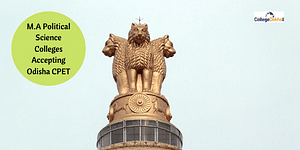BSc Botany Syllabus & Subjects 2025
BSc Botany Syllabus & Subjects Overview
BSc Botany syllabus and subjects covers a wide range of topics, from the fundamentals of cell structure to the higher-level functions and metabolism of plants, which gives students practical experience that helps them understand scientific ideas. The majority of theory-driven papers are accompanied by hands-on experiences in BSc Botany syllabus and subjects, which shows how accurately the syllabus is organised. This helps them apply their experience in practical settings throughout their careers by enabling them to develop the requisite abilities and professional knowledge of scientific notions. BSc Botany syllabus emphasises the core functions of Botanical Science, Plant Pathology, and the Economic value of plants.
BSc Botany Syllabus includes information on Plant Anatomy and Physiology. The fundamentals of BSc Botany Syllabus include Microbiology, Biomolecules and Phytopathology, Morphology and Anatomy, Mycology, Economic Botany, Genetics, Cellular and Molecular Biology, Archegoniate, Plant Ecology, and Phytogeography, among others.
Also, BSc Botany Syllabus includes subjects for skill development in areas such as Environmental Science, Medicinal Botany, Natural Technology, English/MIL Interactions, Biofertilizers, Nursery and Planting, Horticulture, and Floral Design.
Table of Contents
- BSc Botany Syllabus & Subjects Overview
- BSc Botany Year Wise Syllabus
- BSc Botany Subjects
- BSc Botany Course Projects
- Specialisations Offered in BSc Botany
- BSc Botany Syllabus for Entrance Exam
- BSc Botany Syllabus for Distance Education
- BSc Botany Important Books
- BSc Botany Course Structure
- BSc Botany Teaching Methodology and Techniques
- FAQs about B.Sc Botany Syllabus
BSc Botany Year Wise Syllabus
Following is BSc Botany Syllabus for each year:
BSc Botany 1st Year syllabus
BSc Botany first-year syllabus is listed in the table below:
| Semester I | Semester II |
|---|---|
| Embryology and Plant taxonomy | Genetics, Cell Biology & Plant breeding |
| Phytogeography and Plant Ecology | Microbial Diversity, Algae, and Fungi |
| Diversity Of Archegoniate & Anatomy | Practical Lab |
BSc Botany 2nd Year syllabus
The table below contains the second-year BSc Botany syllabus:
| Semester III | Semester IV |
|---|---|
| Bacteria | Fungi Anatomy |
| Anatomy | Practical Lab |
BSc Botany 3rd Year syllabus
The third-year BSc Botany syllabus is given below:
| Semester V | Semester VI |
|---|---|
| Biodiversity- Mycology and Phytopathology | Chemistry |
| Physics | Biology |
| Research Methods | Practical Lab |
BSc Botany Subjects
Following are BSc Botany Subjects and the topics covered:
Algae Anatomy: A group of mainly aquatic, photosynthetic, and nucleus-bearing organisms known as algae which lack the true roots and multicellular reproductive structures of plants.
Bacteria: These tiny, one-celled organisms are referred to as bacteria. They are crucial to the planet's ecosystems and can be found almost anywhere.
Biodiversity: Mycology and Phytopathology: Mycology is a subfield of phytopathology, which is the study of plant diseases, and the two fields have a close working relationship.
Biology: The study of living things is one of the natural sciences. It is an expansive field because there are numerous distinct forms of life on Earth.
Chemistry: The branch of science which is concerned with the characteristics, structure, and framework of substances, and the power that is discharged throughout these procedures.
Diversity of Archegoniate & Anatomy: Archegonium-containing plants are referred to as archegoniate, and anatomy is the study of the human body's structure.
Fungi Anatomy: A typical fungus is said to be composed of a mass of branched, tubular filaments encased in a rigid cell wall, according to fungi anatomy.
Genetics, Cell Biology, and Plant Breeding: Genetics and cell biology are disciplines that study heredity. At the level of entire organisms, it is studied. Plant breeding, the use of genetic principles to create plants with greater human utility.
Microbial Diversity, Algae, and Fungi: Microbial diversity can be described as the variety of distinct forms of single-celled organisms, microbes, archaea, protists, and fungi.
Physics: Physics is the study of matter, including its fundamental components, motion, and behaviour over time and space.
Plant Ecology and Phytogeography: These fields of study concentrate on the geographical distribution of plants on Earth. It discusses the spatial interactions between plants in the past and present.
Plant Taxonomy and Embryology: Plant taxonomy is the study of the description, categorization, and terminology of plants. While the development of the plant embryo happens after the fertilisation of an ovule, which results in a fully formed plant embryo.
BSc Botany Subjects Common for All Semester
The fundamental subjects are thought to be important for understanding the course. Some of the fundamental topics covered in BSc Botany courses are as follows:
- Cytogenetics and Plant Breeding
- Cellular and Molecular Biology and Plant Biotechnology
- Plant Physiology
- Pteridophytes, Gymnosperms, along with Angiosperms
- Morphology, Anatomy, and Embryology
- Microbes, Algae, Fungi, and Bryophytes
- Pteridophytes, Gymnosperms, and Angiosperms
BSc Botany Subjects (Optional)
Optional courses are additional courses that students can be selected during their final four semesters. Following are some examples of BSc Botany electives:
- Bioinformatics
- Economic Botany
- Environmental Biotechnology
- Plant Tissue Culture
- Seed Biology
- Pomology
- Horticulture and Postharvest Technology
BSc Botany Course Projects
All BSc Botany courses require projects. The programme focuses on both individual and group projects that allow teachers to assess students' performance and subject knowledge. The following are the most common BSc Botany projects:
| The effect of temperature on the percentage of mung bean germination |
|---|
| Preliminary phytochemical and antimicrobial screening of citrus sinensis seed and coat |
| The effect of nitrogen fertiliser on plant growth |
Specialisations Offered in BSc Botany
The following are the specialisations offered in BSc Botany
Specialisation in Plant Biotechnology:
You can enrol in this course if you have an interest in learning about crop modification and improvement. The course provides in-depth understanding of genetics, physiology, biochemistry, and plant breeding. There are numerous institutions in India that provide undergraduate and graduate Plant Biotechnology courses.
Subjects:
- Algae, Fungi, and Lichens
- Algal and Fungal Biotechnology
- Bryophytes and Pteridophytes
- Gymnosperms
- Anatomy of Angiosperms
- Taxonomy of Gymnosperms
Specialisation in Forestry:
The study of planting, handling, and preserving forest resources is included in Forestry. The need for this speciality has significantly risen as a result of the shrinking forest cover. You may complete a 4-year undergraduate programme before applying to the 2-year postgraduate programme in Forestry.
Subjects:
- Tree Physiology
- Forest Pathology
- Wildlife Management
- Tribology and Anthropology
- Principles of Forest Economics
- Silviculture
- Forest Management
- Forests and People
Specialisation in Horticulture:
It offers in-depth knowledge about plantations, nurseries, and orchards and is an option for students interested in studying agriculture and food production. Horticulture courses are available at the graduate, postgraduate, doctoral, and diploma levels.
Subjects:
- Commercial Floriculture
- Agricultural Microbiology
- Principles of Seed Production
- Ornamental Gardening
- Interior Scaping
- Greenhouse construction
- Production Economics
Specialisation in Agriculture:
You can pursue studies in Agricultural Technology's various technical and scientific subfields, such as food technology, the dairy industry, food science, plant science, etc. Numerous job opportunities exist for agriculture students, particularly in the public sector. Numerous Bachelor's, Master's, doctoral, and diploma programmes are offered in Agriculture.
Subjects:
- Plant Genetics
- Agricultural Meteorology
- Food Technology
- Animal Husbandry
- Soil Science
- Agriculture Economics
- Agriculture Engineering
- Sericulture
Specialisation in Environmental Sciences:
This one combines the scientific disciplines of Physics, Chemistry, Biology, and Botany along with others like Zoology and Geography. It involves looking into environmental factors, problems, and solutions. You can choose from a large selection of undergraduate programmes offered by top universities in India and around the world for postgraduate, doctorate, and diploma programmes.
Subjects:
- Ecological System
- Pollution and its Control
- Disaster Management
- Geo Environment
- Ecological Principles
- Waste Management
- Environmental Management
BSc Botany Syllabus for Entrance Exam
The entrance exam results and a student's merit determine which students get accepted to Botany courses. Some universities conduct entrance exams for the BSc Botany course. You must meet the cutoff score in order to be accepted into the course. Some institutes prefer students who have completed their 10+2 exams and have a Science background for BSc Botany.
Additionally, prior experience in Science-related fields can improve a student's ability to excel in BSc Botany and comprehend difficult concepts.
The following is the entrance exam syllabus for BSc Botany applicants:
| Name of Examination | Syllabus |
|---|---|
| CUET |
|
BSc Botany Syllabus for Distance Education
If a student does not want to enrol in a full-time programme, they can choose a distance education programme in Botany. Additionally, distance learning programs give students flexibility in their study times and locations, enabling them to balance their academic goals with other obligations. Interested applicants can choose from both UG and PG programmes at numerous colleges throughout the nation. BSc Botany Syllabus for distance learning programmes is the same as that of a full-time course. It covers topics such as:
- Diversity of Microbes
- Diversity of Archegoniates
- Plant Anatomy
- Plant Embryology
- Plant Physiology
- Ecology
- Economic Botany
The following is a list of some colleges that provide distance learning courses in botany:
- IGNOU
- Acharya Nagarjuna University, Centre for Distance Education
- Nalanda Open University
- Wisdom School of Management
- Sri Sai Correspondence College
- Tamil Nadu Open University
BSc Botany Important Books
BSc Botany textbooks give students both a broad overview of the subject matter and an in-depth exploration of their particular area of expertise, enabling them to gain a thorough understanding of the subject. These books give students a well-rounded education in Botany by covering topics like Plant Anatomy, Physiology, Taxonomy, Ecology, and Genetics. They also give students the opportunity to practise their knowledge in real-world situations and hone their critical thinking abilities through exercises and case studies.
The readings for BSc Botany include the following titles:
| Books | Authors |
|---|---|
| Plant Physiology | Taiz and Zeiger |
| Molecular Plant Taxonomy | Pascale Besse |
| Advanced Microscopy in Mycology (Fungal Biology) | Kirk J. Czymmek, Tanya E.S. Dahms |
| Introduction to Fungi | Roland WS Webster, John Webster |
| The Cambridge Illustrated Glossary of Botanical Terms | Michael Hickey and Clive King |
| Concise Encyclopaedia of Plant Pathology | P. Vidhya Sekaran |
| Encyclopaedia of Plant and Crop Science | Robert M. Goodman |
| Principles of Genetics | Gardner, Simmons, and Snus tad |
| Cell- A Molecular Approach | Cooper and Hausmann |
| Principles of Biochemistry | Lehninger |
BSc Botany Course Structure
The coursework for a three-year BSc Botany undergraduate programme consists of six semesters. The diversity of Seed Plants, Plant Anatomy, Plant Physiology, and Plant Embryology are some of the subjects covered in the course. In their first year of study, students will learn about basic concepts in Botany, such as Plant Taxonomy and Ecology.
They will also learn useful skills through lab work and field trips. In the second year, students will broaden their knowledge of specialised areas of Botany such as Plant Pathology and Genetics. The final year will be focused on advanced subjects such as Plant Biotechnology and Plant Conservation. Students may also have the opportunity to complete independent research projects or internships to further their understanding of botany.
The general BSc Botany course structure is as follows:
- 6 Semesters
- Electives
- Fundamental Subjects
- Lab and Practical Workshops
BSc Botany Teaching Methodology and Techniques
Numerous teaching techniques are used in the BSc Botany Syllabus. Botany concepts are taught to students in the classroom and through hands-on lab work, among other methods. Methodologies and techniques for teaching BSc Botany include:
- Lecturing
- Cooperative Learning (students help each other learn about a topic)
- Concept Mapping
- Discussion
- Reading
- Practical Activities
These teaching techniques are meant to involve students and enhance their understanding of botany. Cooperative learning promotes collaboration and peer-to-peer learning, whereas lecturing allows for the organised delivery of information. Concept maps help students organise their knowledge and draw connections between different ideas. While reading gives students the opportunity for independent study, discussion fosters critical thinking and active participation. Last but not least, practical exercises let students apply their classroom learning.
FAQs about B.Sc Botany Syllabus
What are the highest paying Jobs in BSc Botany?
Horticulturist is one of the top occupations in botany among others such as Agronomist, Professor, Landscape Designer, and Environmental Scientist.
Is BSc Botany good for the future?
With a BSc in Botany in hand, you'll have a plethora of options for further studies, research, and lucrative job opportunities in India and abroad. Contrary to popular belief, the only further study option for botany graduates is to pursue an MSc in the subject. Botany graduates have numerous exciting opportunities in a variety of fields such as Nursery, Farms, Agriculture, Environmental, Pharmaceutical Industry, Genetics, Taxonomists, Molecular Biologists, and can expect to earn between INR 2.5 - INR 5 LPA.
Who can do BSc Botany?
Candidates with a 10+2 in Physics, Chemistry, Mathematics, or Biology are eligible to apply for this course.
What are the entrance examinations required for admission in BSc Botany?
CUET is the entrance exam used for admission to BSc in Botany.
What are the best colleges that offer a BSc Botany course?
Hindu College in New Delhi, Miranda House College in New Delhi, Hansraj College in New Delhi, Fergusson College in Pune, Ramjas College in New Delhi, and St. Xavier's College in New Delhi are the top colleges for BSc Botany.
What are the job options after BSc in Botany?
Following a BSc in Botany, one can work as an Ecologist, Plant Biochemist, Researcher, Environmental Consultant, Park Ranger, or Botanist.
How much a BSc in Botany graduate can earn?
BSc Botany graduates can expect to make between INR 2.50 and 5 LPA.
What courses can be done after BSc Botany?
Following a BSc in Botany, students can pursue the following degrees: MSc in Botany, MSc in Forestry, MSc in Horticulture, MSc in Biotechnology, and MSc in Microbiology.
What is BSc Botany?
The three-year BSc Botany undergraduate programme focuses on the study of plants and their anatomy.
What are the subjects in BSc Botany?
Subjects covered in BSc Botany include:
- Plant Anatomy
- Plant Physiology
- Plant Embryology
- Biology and Diversity of Seed Plants
- Bioethics
- Environmental Studies
- Plant Evolution
Can I study Botany without Maths?
Yes, maths is not required for a Bachelor's degree in Botany Science, but you do need to be familiar with Chemistry, Physics, and Biology.
What are the subjects in BSc Botany 1st year?
The subjects covered in BSc Botany 1st year are:
- Plant taxonomy And Embryology
- Cell Biology, Genetics & Plant Breeding
- Plant Ecology & Phytogeography
- Microbial Diversity, Algae, and Fungi
- Diversity of Archegoniate & Anatomy
- Practical Lab
Is there a summer internship for a BSc Botany course in India?
Yes, students pursuing a BSc in Botany can take up summer internships. Many graduates prefer working as Project Interns at IISER Kolkata.
Which is easier: BSc Botany or BSc Zoology?
Students think Zoology is simpler than Botany because it frequently combines human and animal biology. However, because the terminology is unfamiliar and plants appear unusual, it seems a little more difficult.
Is Botany tough?
Botany is an intriguing topic, and just like other subjects, how challenging (hard) it is to learn depends on how interested you are in it.
What are the basic concepts of BSc Botany?
Botany is the study of all living things that look like plants, such as fungi, ferns, mosses, algae, and actual plants. This course is designed to teach students about plants from a micro to macro perspective, as well as their importance in the overall environment.
What is the average course fee for BSc Botany?
For BSc Botany full-time courses, the typical course fee ranges from INR 15K to INR 1L.
Popular Courses
- Courses
- B.Sc Botany
- Syllabus


















